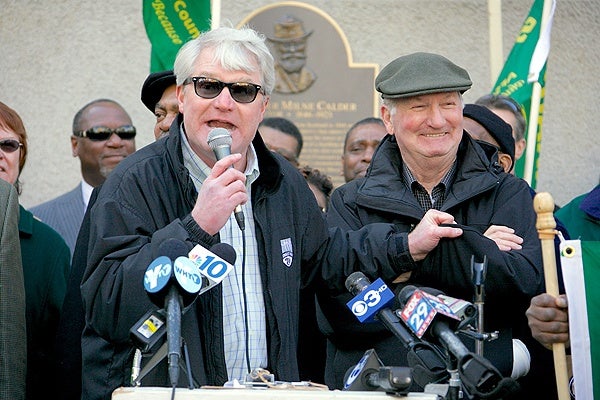Sources say Nutter will propose 1.3 percent property tax rate for Philadelphia
Some Philadelphians have been worried sick about what Mayor Michael Nutter’s proposed property-tax rate will be.
On Thursday, Nutter will end the mystery when he unveils his financial plan for fiscal year 2014. He is planning to propose a new property-tax rate of roughly 1.3 percent, City Hall sources said.
Nutter also wants a $15,000 homestead exemption, which is a property-tax break for homeowners, according to sources. Currently, the city has a homestead exemption on the books worth $30,000 — meaning that homeowners would not be taxed on the first $30,000 of their house’s assessment.
Throughout the last few weeks, residents have gotten their new property assessments from the city. They are part of Nutter’s plan to overhaul the property-tax system so that assessments are based on real market values, while also bringing in the same amount of property tax revenue in 2014 as in 2013.
In past years, the city’s property assessments have been enormously inaccurate and unfair. Nutter said his plan fixes that.
Because of the new assessments, some property owners will see a tax increase, while others will see a reduction.
As if property taxes weren’t enough to anger the public, union members are also expected to protest Nutter’s labor decisions at his budget speech to City Council on Thursday.
A coalition of union leaders and members railed against Nutter outside of City Hall on Wednesday. They included District Council 33 president Pete Matthews, District Council 47 president Cathy Scott, IBEW Local 98 Business Manager John Dougherty and Philadelphia AFL-CIO President Pat Eiding.
The leaders said they are unhappy that the city’s blue- and white-collar union members, as well as firefighters, have been working without a contract for several years. Some leaders said that they’re so furious that they might try to block Nutter and his team from entering Council’s chambers.
“I don’t know whether there’s going to be a budget message tomorrow or not,” said Henry Nicholas, head of the national health care employees union. “Since they are not looking out for the people, they shouldn’t get in.”
Nutter said that he respects the unions’ right to protest. But he thinks he ought to be able to give his speech to the public, too.
“Certainly our union employees have a right to express themselves,” Nutter said. “I would hope that the members individually, and certainly their leaders, would respect the City Council chambers.”
Mayoral spokesman Mark McDonald said that Nutter is fighting for labor changes that will help make the city financially stable for years to come.
McDonald did not respond to our request to confirm the proposed property-tax rate. Nutter did, however, comment on his general strategy when it comes to property taxes.
“Our dual goals, if you will, are to have the lowest possible rate with a decent amount of tax relief measures,” Nutter said. “Clearly there are neighborhoods where gentrification is a really serious issue.”
Nutter said that he supports a state bill that would allow the city to provide means-tested tax relief for longtime homeowners in gentrified neighborhoods.
Nutter also said that “there’s actually some positive news in a variety of places in the budget,” although he wasn’t specific.
On the other hand, Zack Stalberg, president of the government watchdog group Committee of Seventy, said there’s a lot to worry when it comes to the budget. Especially the city’s ballooning pension costs.
“Really, [Nutter’s] got to find some way to bring the labor negotiations to a head and try to get pension reform,” Stalberg said. “It’s time to finally establish what this administration is all about.”
Sam Katz, chairman of the fiscal watchdog Pennsylvania Intergovernmental Cooperation Authority, also said that Philadelphia is facing huge budget problems: pension woes, unresolved labor contracts, the flat-broke School District. Plus, there are the city’s new property-tax assessments, which have been questioned by City Controller Alan Butkovitz and Councilman Mark Squilla.
Katz said these issues are “all coming to what looks like an outrageous storm amidst an environment of finger-pointing, name-calling.”
He said that political leaders should join forces to solve the city’s dilemmas. Or else Philly could suffer.
“Having the leaders of the city working together, thinking about what’s best for the city and not their own political careers, that would help,” Katz said. “We have some really huge problems that are now putting at risk the vitality and resurgence of the city.”
The drop-dead deadline for Council to pass a budget is June 30.
WHYY is your source for fact-based, in-depth journalism and information. As a nonprofit organization, we rely on financial support from readers like you. Please give today.









